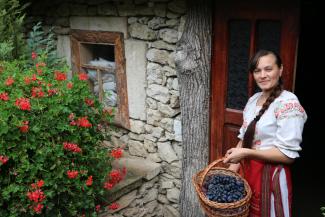October 2016—As the poorest country in Europe, Moldovan citizens face many challenges when it comes to finding decent jobs at home. Given this and other economic and social challenges, thousands of Moldovans are forced to move to larger cities or go abroad to support their families and provide better opportunities for their children.
It is especially hard for women in rural areas, where conservative social norms, limited access to professional education, and lack of economic opportunities push them to move away from their families in search of gainful employment.
Olesea Falaga, 36, was born into a family of farmers in a small village in central Moldova. She dreamed of becoming an elementary school teacher, but had to drop out of school after the ninth grade to take care of her sick mother and permit her older brother to pursue his university degree.
From an early age, Falaga worked hard on the small piece of land owned by her family and earned a living by selling fruits, vegetables, homemade cheese and wine. Since the work was hard and she did not make enough money to adequately provide for her family, Falaga moved to Moldova’s capital, Chisinau, and found work in a small neighborhood grocery store.
About five years ago, she took a job taking care of a small hotel in Butuceni, a village about one hour from Chisinau, in a region known to be rich in Moldovan culture and history. At first, Falaga was the hotel’s only employee and had to do everything necessary to make each visitor’s stay pleasant and comfortable.
In 2013, the hotel’s owner, Anatol Botnaru, contacted USAID’s Competitiveness Enhancement and Enterprise Development II Project and received technical assistance focused on product development and diversification. The hotel subsequently grew into a touristic center called “Eco-resort Butuceni” that includes a hotel, restaurant and a catering company. Falaga now manages a team of more than 30 people and serves more than 2,500 customers each month.
“In the past, I could not see my future in the village. Now I can’t imagine living anywhere but here—running the eco-resort and sharing the uniqueness of our culture and beautiful surroundings with people from all over the world,” said Falaga.
Tourism development is one of several strategic areas that USAID is working on in Moldova to improve the country’s economic development and competitiveness in the region. With the support, Botnaru and others like him created an industry association that started promoting Moldova as a regional tourism destination, with a special focus on its unique culture and gastronomy. USAID is also helping business owners to develop supplementary tourism products and services to attract more visitors.
“I have never thought I was capable of managing a successful business and supervising other people,” said Falaga. “But here I am and I am extremely proud of my accomplishments and the place I work.”
To date, several dozen women from Butuceni and other nearby villages have found full-time and part-time employment with various small resorts in the area. There is also a large demand for seasonal jobs, including harvesting fruit and vegetables, and turning them into jellies, jams, pies, cakes and other treats.
USAID has been working with Moldova’s tourism industry since 2012 to brand and market the country as an attractive tourism destination. Following the launch of the country’s tourism brand—the Tree of Life—in late 2014, the number of foreign visitors grew by 28 percent in 2015, reaching 2.9 million. Rural hotels like Eco-resort Butuceni, located in the key wine regions of Moldova, benefit from USAID‘s support pertaining to product diversification and quality improvement. These factors helped increase the number of domestic and foreign visitors to the country during the first sixth months of 2016 by three times over the same period in 2015. Although Moldova's tourism industry remains modest, it contributes to poverty alleviation and reduces migration, especially in rural areas.
LINKS
Follow @USembMoldova, on Facebook
,“I have never thought I was capable of managing a successful business and supervising other people. But here I am, and I am extremely proud of my accomplishments and the place I work.”

Ludmila Bilevschi, USAID
